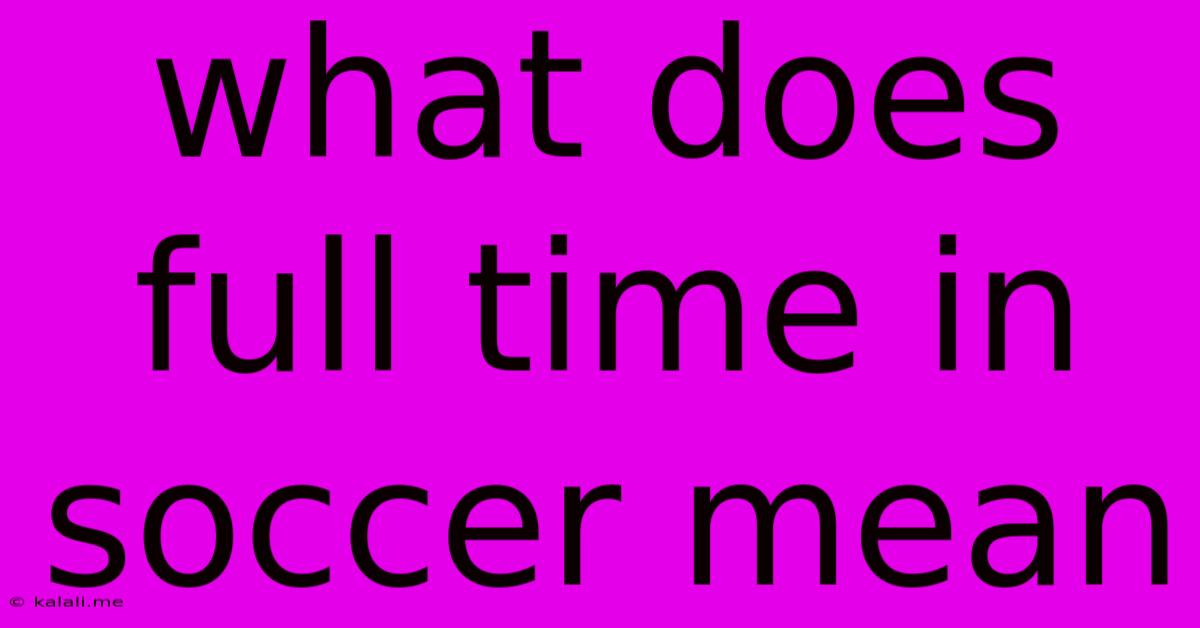What Does Full Time In Soccer Mean
Kalali
Jun 06, 2025 · 3 min read

Table of Contents
What Does Full Time in Soccer Mean? Understanding Match Durations and Stoppages
So, you're watching a soccer match, and the announcer declares "Full Time!" But what exactly does that mean? This seemingly simple phrase encompasses a crucial aspect of the game's structure and understanding it enhances your viewing experience. This article will delve into the intricacies of "full time" in soccer, clarifying the match duration, injury time, and potential extra time scenarios.
Understanding the Standard Match Duration
A standard soccer match, whether it's a friendly, league game, or cup tie, is officially scheduled for 90 minutes. This is divided into two 45-minute halves, with a 15-minute half-time break in between. This 90-minute timeframe is the fundamental understanding of a game's duration.
The Role of Injury Time (Added Time)
However, the clock rarely stops in soccer. Injuries, substitutions, and other stoppages frequently disrupt the flow of play. To compensate for this lost time, the referee adds injury time (also called added time or stoppage time) at the end of each half. This added time isn't a fixed amount; it's determined by the referee's judgment based on the amount of time lost during the half. It can range from a minute or two to several minutes, depending on the circumstances of the game.
When is "Full Time" Actually Called?
"Full Time" is announced only after the referee has accounted for all injury time at the end of the second half. This means the 90 minutes of scheduled play, plus any injury time added in both halves, have been completed. The final whistle signifies the end of the game, declaring "Full Time".
Beyond Regular Time: Extra Time and Penalties
In certain competitions, like knockout cup games, a draw at the end of full time might necessitate further play. In these scenarios, extra time is added – usually two 15-minute periods. If the score remains tied after extra time, a penalty shootout decides the winner. It is important to note that "full time" only refers to the initial 90 minutes of play; extra time and penalties are separate phases of the match.
Key Takeaways:
- 90 minutes: The standard playing time of a soccer match.
- Two 45-minute halves: The match is divided into two halves with a 15-minute break.
- Injury Time: Added to compensate for stoppages during play. The referee determines the length of added time.
- Full Time: Declared after the 90 minutes plus any added injury time in both halves are complete.
- Extra Time: Added in certain competitions if the score is tied after 90 minutes.
- Penalty Shootout: May occur after extra time if the score remains tied.
Understanding the meaning of "Full Time" in soccer provides a deeper appreciation for the game's dynamics and the role of the referee in managing time effectively. It clarifies the distinction between the scheduled time and the actual duration of a soccer match, taking into account the often unpredictable nature of the game.
Latest Posts
Latest Posts
-
Why Is Adam So Scarred Dark
Jun 07, 2025
-
Youngs Modlulus Vs Cold Work For A Ductile Material
Jun 07, 2025
-
Single Pole Vs Double Pole Breaker
Jun 07, 2025
-
An Employee Who Appropairty Protized Tasks
Jun 07, 2025
-
How To Dispose Of Lipo Batteries
Jun 07, 2025
Related Post
Thank you for visiting our website which covers about What Does Full Time In Soccer Mean . We hope the information provided has been useful to you. Feel free to contact us if you have any questions or need further assistance. See you next time and don't miss to bookmark.